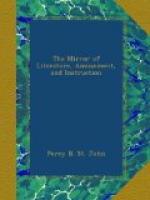The embellishments of the Gem, fifteen in number, have been selected by A. Cooper, Esq. R.A. The Death of Keeldar is a beautiful composition by Mr. Cooper, and is worthy of association with Sir Walter Scott’s pathetic ballad. The Widow, by S. Davenport, from a picture by R. Leslie, R.A. is one of the most touching prints we have yet seen, and every one is capable of estimating its beauties, since its expression will be sure to fasten on the affections of the beholder. May Talbot, by J.C. Edwards, from a painting by A. Cooper, is admirable in design and execution. Of the Temptation on the Mount, engraved by W.R. Smith, after Martin, we have spoken in our accompanying Number; but as often as we look at the plate, we discover new beauties. It is a just idea of “all the kingdoms of the earth;” the distant effect is excellent, and the “exceeding high mountain” is ably represented. The faces in the Painter’s Study are decidedly superior to the rest of the print. The Fisherman’s Daughter, from a painting by Bone, is pleasing; and Venice, with the Embarkation of the Doge, is a stirring scene of pageantry and triumph.
Among the poetry is the Painter’s Song, a pleasing composition, by Barry Cornwall, who has also The Victim, a dramatic sketch of twenty pages. Stanzas by Horace Smith, Esq. are a pleasant satire upon the little vanities of great people. We give the Dream of Eugene Aram in full, although it consists of nearly two pages of small type.:—
* * * * *
THE DREAM OF EUGENE ARAM.
BY T. HOOD, ESQ.
[The late Admiral Burney went to school at an establishment where the unhappy Eugene Aram was usher subsequent to his crime. The admiral stated, that Aram was generally liked by the boys; and that he used to discourse to them about murder in somewhat of the spirit which is attributed to him in this poem.]
’Twas in the prime of summer time,
An evening calm and cool,
And four-and-twenty happy boys
Came bounding out of school:
There were some that ran and some that leapt,
Like troutlets in a pool.
Away they sped with gamesome minds,
And souls untouch’d by sin:
To a level mead they came, and there
They drave the wickets in:
Pleasantly shone the setting sun
Over the town of Lynn.
Like sportive deer they coursed about,
And shouted as they ran,—
Turning to mirth all things of earth,
As only boyhood can;
But the Usher sat remote from all—
A melancholy man!
His hat was off, his vest apart,
To catch heaven’s blessed breeze—
For a burning thought was in his brow,
And his bosom ill at ease:
So he lean’d his head on his hands, and read
The book between his knees!
Leaf after leaf he turn’d it o’er,
Nor ever glanc’d aside—
For the peace of his soul he read that book
In the golden eventide:
Much study had made him very lean,
And pale, and leaden-eyed.




